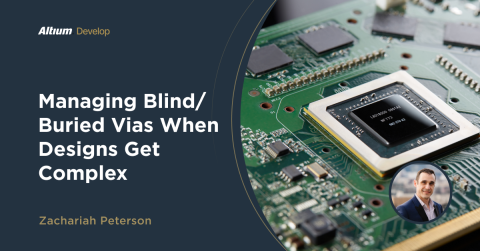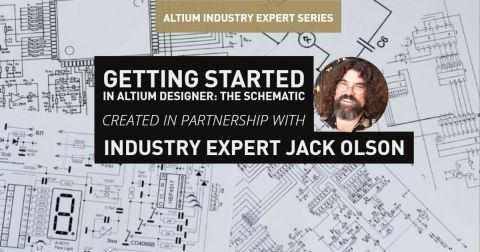Go to Market Fast With Bolt’s In-House Engineering Team and Accelerators
Recently we had the opportunity to get to know Tyler Mincey, the VP of Engineering at Bolt which is a hardware and software accelerator with offices in San Francisco and Boston. In this interview, we talk with Mincey about his passion for engineering and the incredible work being accomplished at Bolt. Their unique model of providing venture capital along with an in-house engineering team continues to fuel a growing portfolio. Bolt is part of Altium’s startup program Launch Pad, which helps provide Altium Designer® licenses to accelerators and innovative fledgling hardware startups around the world.
Judy Warner: Please tell us about your professional background and give us an overview of Bolt.
Tyler Mincey: I’ve led cross-functional engineering and design teams building connected products at companies large and small. I was an engineering team lead at Apple in iPod new product development and was on the core team for the first gen iPhone. After that, I was a partner at Fictive Kin, a digital product studio specializing in design and development of web/mobile apps. Right before Bolt, I was part of the founding team and VP of Product at Pearl Automation, a startup designing driver assistance technology for the automotive aftermarket.
Bolt is a venture capital firm that invests at the intersection of software and physical products. In addition to funding, we support our portfolio with a senior staff of engineers and designers to help with product development and manufacturing.
I manage the team at Bolt responsible for industrial design, mechanical engineering, electrical engineering, and firmware development.
Warner: Why did Bolt think it was important to have an in-house engineering team--that seems like a unique model?
Mincey: When startups are at such an early stage, they can’t hire a full-time cross functional team to do all the product development work that’s needed and have limited time to develop strategic supply chain relationships. We provide access to a seasoned engineering design team, a state-of-the-art prototyping shop, and an internal knowledge base of best practices and vetted vendors to help address pain points across our whole portfolio.
Warner: What type of tech companies is Bolt engaged with, and how do you choose which are the right fit?
Mincey: We invest in concept-stage companies using technology-driven solutions to solve problems in large markets. Key factors that we look for are the size of the market opportunity, the talents of the co-founders, and the novel problem solving approach.
Warner: What are typical mistakes startups make, and what advice would you give based on your experience?
Mincey: It is a textbook answer but it can’t be said too much. A big problem is spending too much time, money, and effort developing a product that not enough customers want. We encourage companies to test with paying customers as quickly as possible, even if it’s with a prototype that is not scalable to validate its value before making the product scalable.
Warner: You have had a unique mix of professional experiences in mechanical, electrical and software engineering--working for big and small companies. What inspired you to work with a company like Bolt and what keeps you energized relative to your work?
Mincey: It all starts with the people. Bolt has an amazingly talented team that gets to work with amazing entrepreneurs solving important problems across many industries.
Warner: What obstacles arise for startup companies relative to PCB design, and how does Bolt help their portfolio companies overcome them?
Mincey: We often help companies decide how much risk to bite off fully optimizing their system architecture vs using off-the-shelf modules or simpler PCB technologies. For first generation products, the priority is delivering seamless features as quickly as possible, not necessarily optimizing cost, form-factor, or power.
Warner: Due to the current component shortage and allocation of --the current supply chain conditions seem somewhat hostile for startups. How do you address this?
Mincey: We benefit from the wisdom of the crowd across our 65+ portfolio companies, but that’s still a fundamental challenge. When accommodating schedules for companies that are software driven, you have more time to plan ahead.
Warner: There appears to be a current spike in hardware startups. What applications and dynamics do you think are driving this (i.e., the IoT?)
Mincey: We’re benefiting from the hundreds of billions of dollars poured into core technology development in the mobile devices market for the past decade. The core hardware components are cheaper, smaller, more powerful, lower power than ever and software tools have mature communities that allow companies to deliver products with small teams that would have been unheard of in the past.
That being said, it is still very hard to bring a hardware product to market as a startup. We like solving hard problems that we’re good at.
Warner: What technology growth markets does Bolt find of interest to track over the next 5-10 years?
Mincey: We’re excited about the continued success of digitally vertical brands and the tools for product definition and customer relationship building that are applicable to every industry and B2B products as well.
We’re excited by companies with innovative business models that use physical goods to support high margin recurring revenue. This allows companies to target smaller segments of the market more deeply, invest in environmentally conscious and ethical manufacturing, and develop defensible core technology.
We’re excited about the new ecosystem of aerospace companies developing the the infrastructure and applications for the next generation of space visionaries, such as our portfolio company Orbit Fab.
Warner: Thank you, Tyler for sharing your insights into startups and telling us about the exciting work that Bolt is doing.
Mincey: It’s my pleasure and thank you for the opportunity to share our story and vision.
See the recent OnTrack podcast with Tyler Mincey here and check out Bolt’s blog here.










